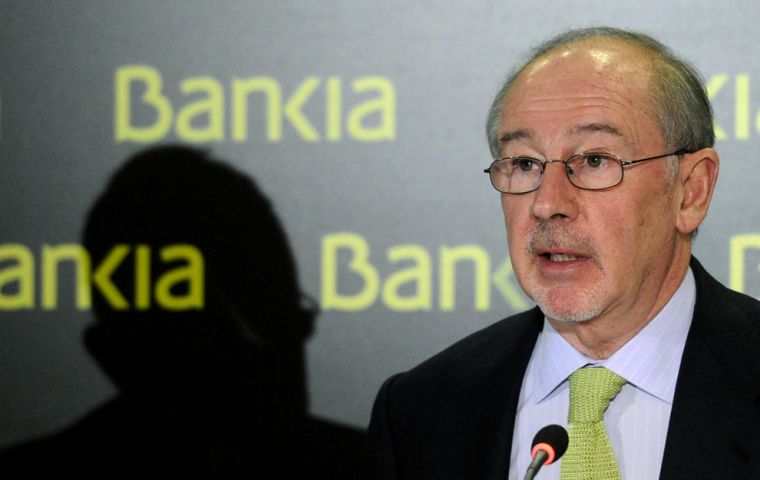MercoPress. South Atlantic News Agency
Spain to unveil on Friday plan to clean up exposed banks to the property crash
 Former IMF chief Rato stepped down from Bankia on Monday (Photo: AFP)
Former IMF chief Rato stepped down from Bankia on Monday (Photo: AFP) Spanish shares have fallen and the interest rate on the country's benchmark 10-year bond has risen amid fresh worries over the banking sector. The Ibex market fell by 3% and bond yields rose above 6%, a level seen as unsustainable.
On Friday, Madrid will unveil a plan to clean up banks exposed to the property and construction sector crashes. Much focus will be on Bankia, which holds 32bn Euros in distressed property assets and whose boss has resigned.
Rodrigo Rato, who stepped down as Bankia's executive chairman on Monday, was a former head of the International Monetary Fund. Last month, it was confirmed that the Spanish economy was in recession.
Concern over the weakness of the economy and the deficit has driven up the cost of borrowing for Spain, raising fears it will need a bailout.
That worry has been heightened by the realisation that there is a multi-billion funding gap in the Spanish financial system linked to the 2008 property crash.
Lenders are trying to write down 54bn Euros of losses on bad property investments and will struggle to find the extra funds without state assistance.
The current Spanish government, elected in December, has so far insisted that no public money would be used to rescue banks. But Prime Minister Mariano Rajoy conceded on Monday that “if it were necessary to prompt lending”, he would do so “as a last resort”.
“The banking issue has been allowed to fester for three years. More public cash will raise funding costs for the government, but it's worth the risk,” said Gilles Moec, an analyst at Deutsche Bank.
Bankia has the industry's biggest exposure to the property market. Spain's fourth-biggest, it was only created in 2010 from a merger of seven struggling savings bank.
Spain's banks are estimated to have around 300 billion Euros in total exposure to the building sector which includes property seized as collateral equivalent to around 30% of the country's GDP and of that about 60% is problematic.
Spain is suffering its second recession in three years and has the highest unemployment rate in the European Union at 24.4 percent, pushing more Spanish businesses and individuals to default on their debt.
The government recognizes some banks will not be able to make the new provisions but is still working on a plan for those cases, a government source said.




Top Comments
Disclaimer & comment rules-

-

Read all commentsThe plan is to nationalize Argentina and sell it on the open market. They are hoping to make 10 pesos out of it.
May 10th, 2012 - 12:41 pm 010 pesos? Wow! They'll be lucky. Haha.
May 10th, 2012 - 06:13 pm 0Commenting for this story is now closed.
If you have a Facebook account, become a fan and comment on our Facebook Page!